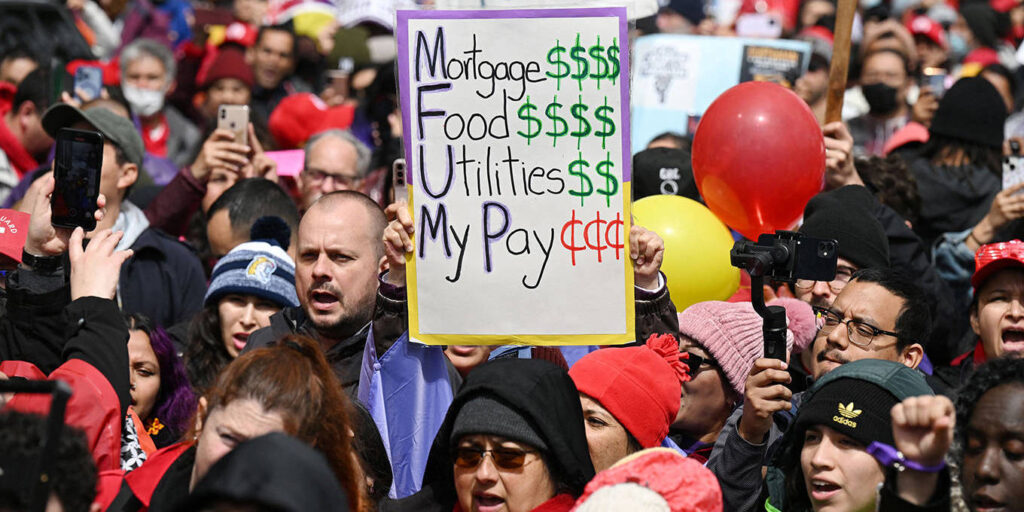Inequality and Democracy
NOBEL LAUREATES, 4 Sep 2023
Joseph E. Stiglitz, Nobel Economics Laureate – TRANSCEND Media Service
31 Aug 2023 – With the right political reforms, democracies can become more inclusive, more responsive to citizens, and less responsive to the corporations and rich individuals who currently hold the purse strings. But salvaging democratic politics also will require far-reaching economic reforms.
There has been much handwringing about the retreat of democracy and the rise of authoritarianism in recent years – and for good reason. From Hungarian Prime Minister Viktor Orbán to former Brazilian President Jair Bolsonaro and former US President Donald Trump, we have a growing list of authoritarians and would-be autocrats who channel a curious form of right-wing populism. Though they promise to protect ordinary citizens and preserve longstanding national values, they pursue policies that protect the powerful and trash longstanding norms – and leave the rest of us trying to explain their appeal.
While there are many explanations, one that stands out is the growth of inequality, a problem stemming from modern neoliberal capitalism, which can also be linked in many ways to the erosion of democracy. Economic inequality inevitably leads to political inequality, albeit to varying degrees across countries. In a country like the United States, which has virtually no constraints on campaign contributions, “one person, one vote” has morphed into “one dollar, one vote.”
This political inequality is self-reinforcing, leading to policies that further entrench economic inequality. Tax policies favor the rich, the education system favors the already privileged, and inadequately designed and enforced antitrust regulation tends to give corporations free rein to amass and exploit market power. Moreover, since the media is dominated by private companies owned by plutocrats like Rupert Murdoch, much of the mainstream discourse tends to entrench the same trends. News consumers thus have long been told that taxing the rich harms economic growth, that inheritance taxes are levies on death, and so forth.
More recently, traditional media controlled by the super-rich have been joined by social-media companies controlled by the super-rich, except that the latter are even less constrained in spreading misinformation. Thanks to Section 230 of the 1996 Communications Decency Act, US-based companies cannot be held liable for third-party content hosted on their platforms – or for most of the other social harms they cause (not least to teenage girls).
In this context of capitalism without accountability, should we be surprised that so many people view the growing concentration of wealth with suspicion, or that they believe the system is rigged? The pervasive feeling that democracy has delivered unfair outcomes has undermined confidence in democracy and led some to conclude that alternative systems might produce better results.
This is an old debate. Seventy-five years ago, many wondered whether democracies could grow as fast as authoritarian regimes. Now, many are asking the same question about which system “delivers” greater fairness. Yet this debate is unfolding in a world where the very wealthy have the tools to shape national and global thinking, sometimes with outright lies (“The election was stolen!” “The voting machines were rigged!” – a falsehood that cost Fox News $787 million).
One of the results has been deepening polarization, which hampers the functioning of democracy – especially in countries like the US, with its winner-take-all elections. By the time Trump was elected in 2016 with a minority of the popular vote, American politics, which once favored problem-solving through compromise, had become a bald-faced partisan power struggle, a wrestling match where at least one side seems to believe there should be no rules.
When polarization becomes so excessive, it will often seem as though the stakes are too high to concede anything. Rather than looking for common ground, those in power will use the means at their disposal to entrench their own positions – as the Republicans have done openly through gerrymandering and measures to suppress voter turnout.
Democracies work best when the perceived stakes are neither too low nor too high (if they are too low, people will feel little need to participate in the democratic process at all). There are design choices that democracies can make to improve the chances of hitting this happy medium. Parliamentary systems, for example, encourage coalition building and often give power to centrists, rather than extremists. Mandatory and ranked-choice voting also have been shown to help in this respect, as does the presence of a committed, protected civil service.
The US has long held itself up as a democratic beacon. Though there has always been hypocrisy – from Ronald Reagan cozying up to Augusto Pinochet, to Joe Biden failing to distance himself from Saudi Arabia or denounce the anti-Muslim bigotry of Indian Prime Minister Narendra Modi’s government – America at least embodied a shared set of political values.
But now, economic and political inequality have grown so extreme that many are rejecting democracy. This is fertile ground for authoritarianism, especially for the kind of right-wing populism that Trump, Bolsonaro, and the rest represent. But such leaders have shown that they have none of the answers that discontented voters are seeking. On the contrary, the policies they enact when given power only make matters worse.
Rather than looking elsewhere for alternatives, we need to look inward, at our own system. With the right reforms, democracies can become more inclusive, more responsive to citizens, and less responsive to the corporations and rich individuals who currently hold the purse strings. But salvaging our politics also will require equally dramatic economic reforms. We can begin to enhance the well-being of all citizens fairly – and take the wind out of populists’ sails – only when we leave neoliberal capitalism behind and do a much better job at creating the shared prosperity that we acclaim.
______________________________________________
 Joseph Eugene Stiglitz is an American economist and a professor at Columbia University. He is a recipient of the Nobel Prize in Economic Sciences (2001) and the John Bates Clark Medal (1979). He is a former senior vice president and chief economist of the World Bank and is known for his critical view of the management of globalization, free-market economists (whom he calls “free market fundamentalists”), and some international institutions like the International Monetary Fund and the World Bank. Stiglitz is the author of The Price of Inequality and most recently of People, Power, and Profits: Progressive Capitalism for an Age of Discontent.
Joseph Eugene Stiglitz is an American economist and a professor at Columbia University. He is a recipient of the Nobel Prize in Economic Sciences (2001) and the John Bates Clark Medal (1979). He is a former senior vice president and chief economist of the World Bank and is known for his critical view of the management of globalization, free-market economists (whom he calls “free market fundamentalists”), and some international institutions like the International Monetary Fund and the World Bank. Stiglitz is the author of The Price of Inequality and most recently of People, Power, and Profits: Progressive Capitalism for an Age of Discontent.
Go to Original – project-syndicate.org
Tags: Democracy, Economics, Elites, Inequality, Nobel Economics Prize
DISCLAIMER: The statements, views and opinions expressed in pieces republished here are solely those of the authors and do not necessarily represent those of TMS. In accordance with title 17 U.S.C. section 107, this material is distributed without profit to those who have expressed a prior interest in receiving the included information for research and educational purposes. TMS has no affiliation whatsoever with the originator of this article nor is TMS endorsed or sponsored by the originator. “GO TO ORIGINAL” links are provided as a convenience to our readers and allow for verification of authenticity. However, as originating pages are often updated by their originating host sites, the versions posted may not match the versions our readers view when clicking the “GO TO ORIGINAL” links. This site contains copyrighted material the use of which has not always been specifically authorized by the copyright owner. We are making such material available in our efforts to advance understanding of environmental, political, human rights, economic, democracy, scientific, and social justice issues, etc. We believe this constitutes a ‘fair use’ of any such copyrighted material as provided for in section 107 of the US Copyright Law. In accordance with Title 17 U.S.C. Section 107, the material on this site is distributed without profit to those who have expressed a prior interest in receiving the included information for research and educational purposes. For more information go to: http://www.law.cornell.edu/uscode/17/107.shtml. If you wish to use copyrighted material from this site for purposes of your own that go beyond ‘fair use’, you must obtain permission from the copyright owner.

“Rather than looking elsewhere for alternatives, we need to look inward, at our own system. With the right reforms, democracies can become more inclusive, more responsive to citizens, and less responsive to the corporations and rich individuals who currently hold the purse strings. But salvaging our politics also will require equally dramatic economic reforms. We can begin to enhance the well-being of all citizens fairly – and take the wind out of populists’ sails – only when we leave neoliberal capitalism behind and do a much better job at creating the shared prosperity that we acclaim.”
Unfortunately, Capitalism( Neoliberalism) in its present form won’t allow these “right reforms”. This is because, the present for profit, commodity exchange market system functions to concentrate financial power and everyone can play this kind of “politics” which makes it so difficult for people get involved in those reforms. In short, the very first thing we need to recognize is the radical plutocracy that we now have and from there learn how to build local, community based economies. This is being done, but it gets hardly or no media coverage. The bottom line is that people have to wake up to the need they have for others through the wealth that we create together and from the delusion that money creates wealth( weal, wellbeing); it doesn’t; people do based upon the natural, given resources that we all depend on and nurturing social bonds.